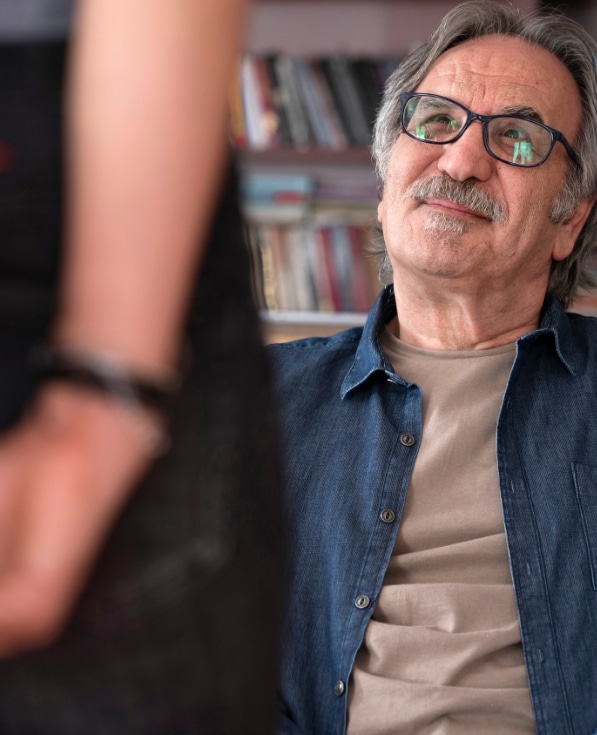Concerned your loved one has an eating disorder?
You’ve come to the right place.
e can assume that if you are reading this, you have concerns about a family member or loved one and are considering reaching out for support. If that is the case – it’s really positive you’re looking into the options. Eating disorders are complex mental illnesses that impact the mind and body of the sufferer, as well as the wider family. They manifest in different ways, meaning that they are unique to the individual and anyone can develop one.
Despite how they may present, eating disorders are not all about food. Rather, food is a symptom of other often deep-rooted issues. You can think about an eating disorder as a negative (or “maladaptive”) coping mechanism, used by the sufferer to block out or control overwhelming emotions. As a family member or carer, it’s important to remember that there’s no one single cause. Rather, a combination of social, psychological and genetic factors that can contribute. Eating disorders can cause significant harm, but they are treatable and recovery is possible.


It might feel uncomfortable, but it’s very important you address your concerns.
Eating disorders can be extremely isolating; trapping the sufferer in a cycle of shame and guilt associated with their behaviours. We understand how difficult it is to address concerns with a loved one, however, noticing signs and symptoms and having a conversation is the first step in their recovery.
Access support for a loved one if…
- You have a gut feeling that things are not OK – an instinct that something is not quite right is usually a good indicator of there being a problem
- Food and/or exercising has started to dictate life decisions that your loved one is taking
- Preparing and eating meals has become a very distressing time, with what seems like a ‘normal’ everyday routine becoming a battle ground
- There are inconsistencies in their relationship to food – eating disorders don’t develop in a linear way and sufferers don’t always ‘fit’ one label or another
- You notice psychological changes – they may begin to isolate themselves as their sense of self-worth and mood deteriorates
- Physical symptoms emerge – whilst weight is by no means the only indicator of an eating disorder, a significant change in weight is important to take notice of. You may notice that someone becomes preoccupied by how they look, constantly checking a mirror or making negative comments about themselves

But how do I begin the conversation?
Educate yourself and the rest of the family on eating disorders and the fact that they are not just about food.
Pick a time to talk when emotions aren’t running high and, where possible, try and avoid talking about food or the more symptomatic aspects of the eating disorder.
Talk together with others involved in supporting your loved one so you can speak in a unified voice.
Remember, do not neglect your own self-care. Whilst it is easier said than done, making time for yourself and getting support for you is vitally important.
You are not alone. There is help for both your loved one AND you.
How will you support me and my family?
Our multi-disciplinary team works together to help clients along in their journey, whilst working with families and to deliver the highest standards of wrap-around care.
Our goal is always to heal the whole person by addressing the underlying causes of the eating disorder. We provide an unrivalled range of treatments and work with our clients to select the best options for them. Everyone’s recovery looks different, and our programmes recognise and reflect that.
We understand the importance of the role of the caregiver and are aware of the demands this role may have on the carers’ lifestyle.
We believe that family members are crucial to someone’s recovery from their eating disorder, yet are all too often are kept on the sidelines whilst their loved one undergoes treatment. This is far from our intention at Orri.
Treatment here involves the family from day 1. Starting with the assessment to frequent sessions of Family Therapy, as well as regular check-ins with our clinicians. No two families are on the same path nor have the same history. We will help you to understand your loved one’s eating disorder, to identify the changes that need to be made, and develop the tools you need to support their recovery. We want to support you through this “illness of the family”.
Is there someone I can speak to in confidence?
Yes. There is always someone to talk to in strictest confidence on the ‘Ask Orri’ helpline.
What can I expect?
Respect, kindness and compassion. Every step of the way.
1. Caregiver Assessment
2. Connecting with other carers
3. Carer/Sibling Groups
4. Carer “Expert By Experience” Meetings
5. Carer Workshops
6. Carer & Client Meal Sessions
Call us today for more information.
We’re here to support the whole family.
Our expert team understands the complexities of eating disorders. All our clinicians are specialists in eating disorders and have spent their careers working alongside people and their families so that recovery becomes possible for all.
We are here to help people overcome eating disorders and deliver the highest standard of care to individuals and their families. Join our unique recovery community in the heart of London.
Accessible and tailored to your loved ones’ needs.
- No waiting list
- Free assessment
- Flexible programmes
- Central London location

But how do I begin the conversation?
To put your mind at ease, we offer a free assessment with our expert team to understand the individual needs of your loved one and create a bespoke programme to support their recovery journey.
